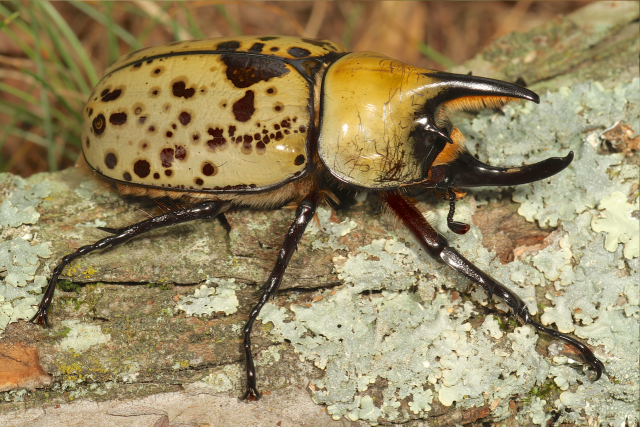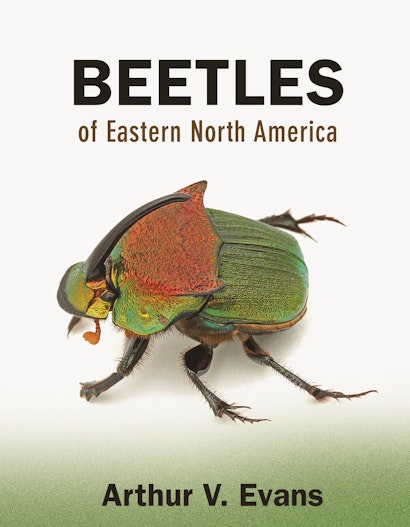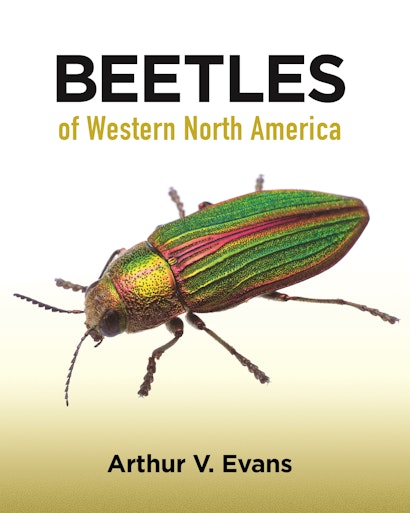With some 400,000 species, beetles are among the largest and most successful groups of organisms on earth, making up one-fifth of all plant and animal species. No other animals exhibit such a dazzling range of size, form, and color. Mostly small, sturdy, and compact, beetles are incredibly well-equipped to find food, reproduce, and avoid predators. Additionally, their collective roles as herbivores, hunters, and recyclers are critical to the sustainability of terrestrial ecosystems. In this lavishly illustrated book, beetle expert and author Arthur Evans presents an inviting and comprehensive introduction to the fascinating lives of the world’s beetles.
Tell us a little bit about your background.
AVE: I grew up on the south-western fringes of the Mojave Desert in southern California, where there were plenty of insects to discover and observe. My parents were incredibly supportive of my interests and took my sister and me on numerous weekend excursions and week-long camping trips to explore natural areas in coastal, desert, and mountain habitats. While in elementary school, I met an entomologist who arranged my first visit behind-the-scenes at the Entomology Section of the Natural History Museum of Los Angeles County, one of the largest natural history museums in the United States. There, I had the opportunity to meet with the curators of the insect collection, all of whom encouraged my interest in entomology. This experience ultimately helped to launch my pursuit of academic degrees focused primarily on the systematics of melolonthine scarab beetles at California State University at Long Beach (B.A., M.S.) and the University of Pretoria (D.Sc.) in South Africa. For the past 23 years I have spent most of my time teaching and writing about insects, especially beetles.
How did you come to write The Lives of Beetles?
AVE: I have always had a strong interest in informal science education and welcome opportunities to share my passion for beetles with audiences of all ages and backgrounds. The Lives of Beetles provided me with an opportunity to write a follow-up to my very first book written with Charles Bellamy, An Inordinate Fondness for Beetles published by University of California Press. In addition to presenting basic information on beetles in clear and accessible language, I also wanted to shine a light on these amazing animals in terms of their significance in science, medicine, and technology.
The Lives of Beetles is filled with surprising and fascinating stories about beetles. Are there any of these in particular that you would like readers to know about?
AVE: The text explores beetle evolution, diversity, distribution, and behavior, and there are chapters dedicated to their roles in inspiring advances in science, medicine, and technology. The last chapter deals with the importance of studying beetles and the need for conserving their habitats. In addition to all this, there are 72 species profiles featuring some of the most interesting beetles from around the world. Among the most peculiar beetles showcased are male jewel beetles that mistakenly direct their amorous attentions on discarded beer bottles, a flea-like species that parasitizes beavers, and a longhorned beetle that stings with its antennae.
How does The Lives of Beetles compare with your two previous books with Princeton University Press, Beetles of Eastern North America and Beetles of Western North America?
AVE: Both of these profusely illustrated books were intended to serve as reference books on the study and identification of beetles in North America that would appeal not only to coleopterists and other entomologists, but also to field biologists and naturalists. The Lives of Beetles presents the natural histories of beetles from around the world and is beautifully illustrated with stunning color images and half-toned illustrations. This book is written in an engaging style and will appeal to readers around the world who are curious about beetles whether or not they possess a science background.
What is your next book about?
AVE: I currently have three more books in the works, two with Princeton University Press. Also intended for a broad audience, Little Book of Beetles is written in the miscellany style that will be packed with various aspects of beetle natural history, folklore, and fun facts. This small tome will feature vintage style watercolor illustrations, color images, and monotonal line drawings. Beetles of Southwestern United States and Northwestern Mexico is a comprehensive full color field guide to more than 2,200 species that inhabit one of the world’s greatest biodiversity hot spots.
Entomologist Arthur V. Evans, D.Sc., is an author, photographer, lecturer, and broadcaster. He teaches at Randolph-Macon College and University of Richmond, and is also a Research Associate at the Smithsonian Institution, Virginia Natural History Museum, and California State Collection of Arthropods. Evans has published 40 scientific papers on the systematics and biology beetles, as well as over 100 popular articles and books on insects and spiders. His books include the National Wildlife Foundation Field Guide to Insects and Spider of North America (2007), Field Guide to Beetles of Eastern North America (2014), National Geographic Backyard Guide to Insects & Spiders of North America (2017) and Field Guide to Beetles of Western North America (2021). For nearly 10 years Evans co-hosted What’s Bugging You? on VPM Richmond Public Radio with Steve Clark. Recently, he and Steve teamed up with animator David Vinson to produce seven videos for television based on the popular radio program. One of these videos, Tails of the Luna Moth, was awarded an Emmy at the 64th National Capital Emmys. He lives in Richmond, Virginia. Twitter @ArthurEvans2023 and Facebook @Dr.Art.Evans.entomologist



